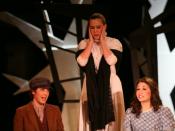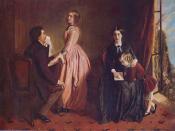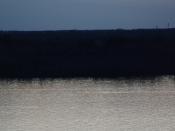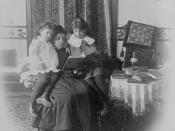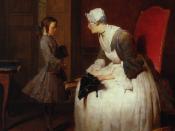Dear Editor,Referring to the response, written by Mr Clarke, to your article (Tuesday 10th: The New Gothicism), I write to express about this supposedly ÃÂdangerousÃÂ trend in education being taught to mature students in high schools. In reality, Gothic texts are an exquisite blend of horror and mystery with elements of romance. The study of such texts allows us to explore the values and beliefs of the time as well as delving into the darker issues of society. There is no proof that studying Gothic texts can lead to ÃÂa path of anti-social, rebellious behaviour in an already disillusioned and directionless groupÃÂ unless you, Mr Clarke, are judging by your own children which doesnÃÂt make for a fair representation of all children you know? Gothic texts make for fantastic reading and viewing and are enjoyed by people of all ages all over the world so why not in schools?The Gothic genre will last the test of time as it is flexible enough to allow it to fit any context through the alteration of the techniques used.
However, what hasnÃÂt changed are the common aspects of the Gothic genre which include uncertainty of life, losing a grip on reality, unfairness of life, power of supernatural forces which canÃÂt be controlled, fear for safety of women and children and physical and social isolation; all of which are in the two set texts The Turn of the Screw (TOTS) and The Others.
In TOTS, the shrouding of details concerning the former governessÃÂs death by Mrs Grose creates a feeling of mystery early in the story. After the governess learns of her predecessorÃÂs death, she asks how it occurs and Mrs Grose replies with: ÃÂHe never told me! I must get back to work.ÃÂ From this, we understand that Mrs Grose is being evasive and trying to avoid giving away any information about the past.
In The Others, we get a similar sort of mystery right from the beginning of the film. The technique of foreshadowing is used to give us an idea of what questions will be answered after viewing the film in its entirety. In the childrenÃÂs bedroom, the children (Nicholas and Anne) question: ÃÂWhenÃÂs Daddy coming home?ÃÂ and their mother (Grace) tries to give nothing away by saying ÃÂWhen the warÃÂs overÃÂ. However, we know that secretly Grace knows that her husband (Charles) was probably killed but she has not received any official notification. We can tell she, just like Mrs Grose, is trying to seem assured of the truth when in reality, they both have their uncertainties.
Another aspect of Gothic in TOTS is the appearance of ghosts. In Chapter 3, the governess takes a walk and hopes to meet someone along the way. She notices a man observing her and she wonders if she had created the image of the man in her mind or if he was actually a ghost. This leads us to ask ourselves whether the governess is losing a grip on reality as well as sanity and is beginning to see things which are non-existent or whether ghosts actually exist. It also touches on the uncertainty of life. Are we to believe that this man is the ghost of a former servant who died, Peter Quint?Later on in the book, while the governess is with Flora and Mrs Grose, she spots Ms Jessel for the second time and draws their attention to her. Neither of them can see anything which gives us further evidence that the governess is losing her grip on reality and is possibly insane. This is most likely due to physical and social isolation as Bly seems to be cut off from the rest of the outside world and due to the fact that the Uncle is asked to be left alone. This may lead to the governess starting to go crazy and hence begin picturing people who are not actually there. This could be a reflection of the beliefs and values at the time of writing as people didnÃÂt regard supernatural forces to be real and they thought those who did were insane. This hasnÃÂt changed in the time leading up to the present.
In the scene of The Others where Anne is sitting wearing her dress on the floor, Grace sees the face of the old woman Anne drew pictures of dressed up as her daughter. She yells out ÃÂYouÃÂre not my daughter!ÃÂ and violently attacks her until AnneÃÂs face reappears. It seems that Grace is starting to also lose her grip on reality and is unsure whether she just imagined the old woman was there or whether ghosts are actually present inside the house. Just like in TOTS, this is caused by physical and social isolation with Grace, at one stage saying ÃÂI must go out. I feel cut off from the rest of the outside world.ÃÂOf course, with the family being strictly Catholic, Grace doesnÃÂt believe in ghosts and uses religion to try to understand life. She believes if she follows all the rules she and her family will be safe. This could provide insight into the beliefs of the time when more people became religious and used it as a way of explaining why they are alive and what happens in the afterlife. This also shows the changing beliefs in the time between the two texts were written; more people probably would have accepted the idea of religion. However, as we can see, the fact that people who believed in supernatural forces were seen as irrational and foolish; for example Anne.
Setting is also vital to a Gothic text and in The Others, we have a large house with only three people living in it and the rest is emptiness. One thing which adds to the element of Gothic is the childrenÃÂs disease ÃÂ photosensitivity ÃÂ which means they cannot be exposed to light. This causes the house to be in constant darkness which is perfect for concealing. It is ironic that in one scene, the children are terrified when the curtains have been removed and they are screaming because of the sunlight whereas normally, children are afraid of the dark.
Through the Gothic genre, we are able to see the darker issues of society put in an entertaining way and understand them in a more thorough way. It provides us useful information to determine the beliefs and values of society at that particular time and allows us to see how we have changed over time. Are we going to allow the likes of Mr Clarke to take away these quality genre texts from high schools?Aubrey TseEastwoodhttp://en.wikipedia.org/wiki/The_Others_(2001_film)http://en.wikipedia.org/wiki/The_Turn_of_the_Screw
